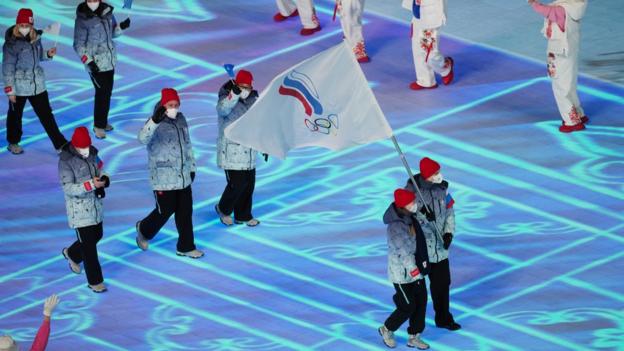A 15-year-old Russian figure skater, Kamila Valieva, has been allowed to continue competing at the Winter Olympics despite failing a drugs test.
It has put the spotlight back on the problem of athletes doping to enhance their performance.
How did Kamila Valieva break the rules?
Valieva helped her team, the Russian Olympic Committee, win a team gold. In her performance she became the first woman in the world to complete a quadruple jump.
However, the International Testing Agency reported that she had failed a drugs test from a sample collected in December.
Valieva tested positive for trimetazidine, which is usually given to people with the heart problem angina. It is on the banned list for athletes because it has been proven to help the heart work better.
However, the Court of Arbitration for Sport allowed Valieva to carry on competing because of her age. She is competing for a second gold medal in the single skating competition, which ends on Thursday.
There are widespread calls for the coaches, medics and authorities around her to be held to account.
What is doping and how is it tested?
Some athletes take drugs to improve their performance, giving them an unfair advantage over their competitors.
Those used include anabolic steroids, hormones, heart medicines, narcotics such as cannabis, and beta-2 agonists (medicines used for asthma control).
Athletes’ blood and urine are tested for performance-enhancing drugs by scientists working for the World Anti-Doping Agency (Wada).
Wada wants to drive doping out of athletics after decades during which many nations, such as the former East Germany, routinely gave their competitors performance-enhancing drugs.
It threatened to wreck the credibility of the Olympics.
Testing is done by regional and national anti-doping agencies under Wada’s command. Athletes can be tested on any day of the year.
What are the penalties for doping?
Athletes can be disqualified from events and made to hand back their medals. They can be banned for four years from playing any sport – either competing in it, training for it, or coaching it.
They may have to also have to pay fines.
There have been calls for Russian athletes to be banned entirely from the Olympics, even when competing in a neutral Olympic Committee team.
Travis Tygart, head of the US Anti-Doping Agency, said the US might try to prosecute those involved in giving Valieva performance-enhancing drugs, using the recently passed Rodchenkov Act.
It enables courts to fine people – including non-Americans – up to $1m (£740,000), or jail them for up to 10 years if their doping activities affected an American athlete’s results.
How has Russia broken doping rules in the past?
In 2016, Russia was revealed to have operated a state-sponsored doping programme across summer and winter Olympic sports.
This included tampering with tests at the 2014 Sochi Winter Games, which Russia hosted and in which it topped the medal table.
A Wada investigating commission revealed that the national anti-doping agency, Rusada, gave athletes advance notice of tests, destroyed thousands of samples, bullied doping control officers and their families, and took bribes to cover up missed tests.
It added that officers from the Russian security service, the FSB, were present at testing labs and this was part of a wider pattern of “direct intimidation and interference by the Russian state with the Moscow laboratory operations”.
Wada said a number of Russian athletes suspected of doping competed at the London 2012 Olympics.
As a result, Russian athletes were banned from track and field events at the 2016 Rio Summer Games. In 2019, Russian teams were banned from all major sporting events by Wada.
The ban was set to last until December this year. One senior member of the International Olympic Committee says Russia should take a “timeout” from future Games until it has eradicated its doping culture.
Russia’s government has denied running a state-sponsored doping programme, but acknowledged the country had a significant problem with doping.
Why are Russian athletes competing in the Beijing Games?
Russia is currently banned from competing at the Summer or Winter Olympics as a nation.
But Russian athletes have been allowed to compete under the flag of a neutral team called the Russian Olympic Committee (ROC).
Competitors must have proved they are clean and have no connection with the previous doping scandal.

ROC competitors who win medals cannot hear the national anthem on the podium, see their flag raised or wear any Russian flags on their clothing.
In the 2020 Summer Olympics in Tokyo athletes of other nations complained that Russians were allowed to compete at all.

Five famous Olympic doping scandals
Sun Yang (China), 2020 Tokyo Games
Swimmer Sun Yang was barred from the Games for refusing to let anti-doping officials take away vials of his blood for testing. His entourage smashed the vials with a hammer. He was banned from competing for eight years.
Marion Jones (USA), 2000 Sydney Games
Marion Jones won three gold medals and two bronzes in Sydney but in 2007 pleaded guilty to taking illegal steroids. She was jailed for six months and stripped of all five medals.
Tony Andre André Hansen (Norway), 2008 Beijing Games
The show jumper was stripped of a bronze medal after his horse Camiro tested positive for a banned stimulant called capsaicin, made from chili peppers.
Ross Rebagliati (Canada), 1998 Nagano Winter Games
The snowboarder had his gold medal for the giant slalom taken away because he tested positive for cannabis. He was given it back because cannabis wasn’t on the list of banned substances at the Olympics. It is now.
Ben Johnson (Canada), 1988 Seoul Games
Ben Johnson won the 100-metre final in record time but was stripped of his gold medal after testing positive for an anabolic steroid.





